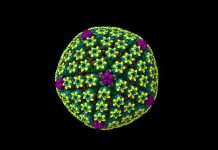Anorexia nervosa is an extreme eating disorder characterized with significant weight loss. Study on genetic origins of anorexia nervosa has revealed that metabolic differences play an equally important role along with psychological effects in the development of this disease. The new understanding can help to develop novel treatments for anorexia.
Anorexia nervosa is a severe eating disorder and a life-threatening illness. The disorder is characterized by low body mass index (BMI), fear of weight gain and distorted body image. It affects 0.9 to 4 percent women and around 0.3 percent men. Patients of anorexia either starve themselves so that they don’t gain any weight, or they heavily exercise and burn extra calories. Anorexia generally causes high mortality rates as it leads to suicides. The treatment of anorexia involves combining psychological interventions and normalizing body weight. These treatments sometimes do not meet with success.
A study published on July 15 in Nature Genetics has revealed that anorexia nervosa is partly a metabolic disorder i.e. it is driven by problems in metabolism. Around 100 researchers worldwide collaborated to conduct a large-scale genome-wide study to identify eight genetic variants linked to anorexia nervosa. The data from Anorexia Nervosa Genetic Initiatives (ANGI), Eating Disorders Working Group of the Psychiatric Genomics Consortium (PGC-ED) and UK Biobank was combined for this study. The total 33 datasets included 16,992 anorexia nervosa cases and around 55,000 controls of European ancestry from 17 countries.
Researchers compared the DNA of the dataset and identified eight important genes which increased risk of the disease. Some of these were linked to psychiatric disorders like anxiety, depression and OCD. Others were associated with metabolic (glycemic), fats (lipids) and body measurement (anthropometric) traits. These overlaps are in addition to the genetic effects which influence body mass index (BMI). Genetic factors also have an effect on one’s levels of physical activity. The results suggest that genetic origins of anorexia nervosa disorder are both metabolic and psychiatric. Metabolism genes appeared to be healthy, but when combined with genes which are associated with psychiatric problems, it increases risk of anorexia.
The current study expands our understanding of genetic origins of anorexia nervosa and reveals that metabolic differences contribute to development of this disorder and thus play an equally important role along with psychiatric or psychological effects. Anorexia nervosa should be classified as a metabo-psychiatric disorder and both metabolic and physiological risk factors need to be explored by doctors to more effectively treat eating disorders and prevent relapse.
***
{You may read the original research paper by clicking the DOI link given below in the list of cited source(s)}
Source(s)
Hunna J. Watson et al. 2019. Genome-wide association study identifies eight risk loci and implicates metabo-psychiatric origins for anorexia nervosa. Nature Genetics. http://dx.doi.org/10.1038/s41588-019-0439-2




































